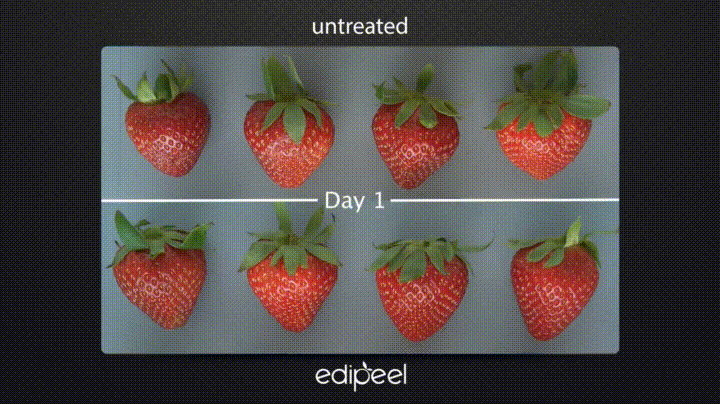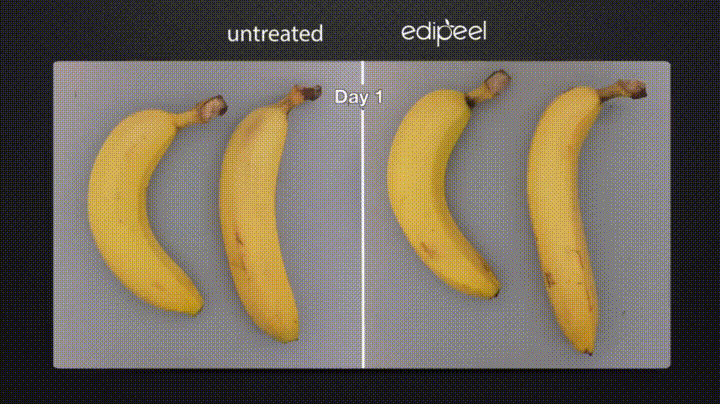Apeel's products, called Edipeel and Invisipeel, are transparent coatings you spray on or dip produce in.
Edipeel keeps water from leaving and oxygen from entering produce, while Invisipeel is for keeping insects away (these are both processes that make produce decay). To get the benefits of both products, you need to apply both.
After the coatings dry, they act as shields to natural gases (e.g. oxygen and ethylene) that make produce decay. With the barrier, produce lasts up to five times longer than untreated produce, Rogers says.
Apeel is testing Invisipeel and Edipeel on all kinds of fruit and vegetables. Below is a timelapse comparison of ripe strawberries — the startup treated the bottom row with Edipeel:
Here's what ripe bananas look like over the course of 10 days. The pair on the right is coated with Edipeel:
The untreated green beans on the left shrivel up after just a few days, while the Edipeel ones stand strong:
Produce with Apeel's products can last an extra two to five days without refrigeration before it starts to rot too, Rogers says. The startup — first spotted by The New York Times — is also testing on avocados, tomatoes, and leafy greens.
The coatings are made from molecules of the discarded materials from organic produce — anything from pear stems to leftover grape skins from wine fermentation to grass clippings.
"We don't discriminate," Rogers says.
When the liquid coating dries, it interacts with a fruit or vegetable's molecules and helps preserve it.
The coating could allow grocery stores and restaurants to source from farms that are further away, while avoiding waste from produce that has ripened too quickly.
For example, it takes 30 days for Chile-grown blueberries to travel to US grocery stores. To keep them fresh, farmers will often coat them in wax and pick them before they're ripe. Trucks also need to heavily refrigerate them (which requires energy and money).
Since Apeel's plant-based products control the rate of decay, they offer a non-GMO solution to preserving produce.
Rogers says Apeel opens the opportunity for produce to be grown in untapped areas, like Peru, that have lower land and labor costs than, say, California.
The Apeel team is also working on using the Edipeel and Invisipeel technology to make fabric that's water-resistant yet breathable.
Rogers came up with the idea for Apeel's products while pursuing a PhD at the University of California-Santa Barbara. On regular trips from campus to a lab in Berkeley, he often passed farms.
Rogers began to think about stainless steel, which includes a carbon and iron barrier that keeps the metal from rusting. He then wondered if he could use the same strategy to protect produce. "That was the genesis of Apeel," he says.
Apeel aims to sell its products for a price higher than normal produce, but lower than organic, Rogers says. The products could help reduce farming and transportation costs, thus lowering produce's costs.









